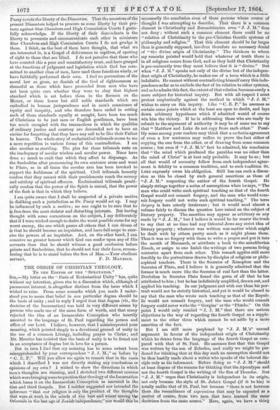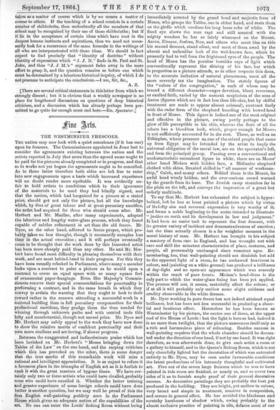THE ORIGIN OF CHRISTIAN THEOLOGY. To THE EDITOR OF THE
"SPECTATOR."
Sin,—My letter on the " Basis of Ecclesiastical Unity" has, quite without my intention, given rise to a discussion which, although of paramount interest, is altogether distinct from the issue which I wished to raise. From some remarks which you made I under- stood you to mean that belief in one particular dogma should be the basis of unity ; and in reply I urged that that dogma (viz., the doctrine of the Incarnation) was held in very different senses by persons who made use of the same form of words, and that many rejected the idea of an Immaculate Conception who heartily assented to the language of St. Paul regarding the person and office of our Lord. I believe, however, that I misinterpreted your meaning, which pointed simply to a devotional ground of unity in the use of a common Liturgy, including prayer to Christ; and Air. Maurice has insisted that the basis of unity is to be found not in an acceptance of dogma but in love for a person.
But in turn I find that my meaning has to some extent been misapprehended apprehended by your correspondent " J. J. M.," as before by " C. E. P." Will you allow me again to remark that in the cases which I described I was not directly stating any conclusions or opinions of my own ? I wished to show the directions in which men's thoughts are running, and I sketched two different courses Which were bringing sometoquestion that theology of thelncarnation which bases it on the Immaculate Conception as narrated in the first and third Gospels. But I neither suggested nor intended the inference "that our religion is only the product of the thoughts that were at work in the minds of the best and wisest among the Orientals in the last age of jewish-hidependencer nor woad this be necessarily the conclusion even of those persons whose course of thought I was attempting to describe. That there is a common element in Christianity and Zoroastrianism even " J. J. M." does not deny ; without such a common element there could be no "relation of Christianity to the pre-Christian Gentile systems of philosophy and religion." That this element should be far larger than is generally supposed, involves therefore no necessary denial of " th3 divine origin of Christianity." The thinkers to whom my remarks pointed would hold that whatever of truth there is in all religions comes from God, and as they hold that Christianity is pre-eminently true they must believe that it is " divine." But when "J. 3. M." speaks not only of the divine but of the indepen- dent origin of Christianity, he makes use of a term which is a little indefinite. He cannot without contradicting himself carry this inde- pendence so far as to exclude the fact of its relation to other systems, and as he admits this fact, the extent of that relation becomes surely a mere subject for historical inquiry. But with all respect I must protest emphatically against the method in which " J. J. IL" wishes to carry on this inquiry. Like " C. E. P." he assumes as certain some points which at the least are open to doubt, and lays down arbitrary hypotheses which if admitted would of course win him the victory. If he is addressing those who are ready to submit to the argument of authority it may be of some use to say that " Matthew and Luke do not copy from each other." Possi- bly some among your readers may think that a verbatim agreement of even a few sentences may suffice to prove the fact either of copying the one from the other, or of drawing from some common source ; but even if "J. J. M.'s" fact be admitted, his conclusion that " the mind which produced the parables was no other than the mind of Christ" is at best only probable. It may be so ; but all that would of necessity follow from such independent agree- ment is fidelity to a common tradition, and to such tradition St. Luke expressly owns his obligation. Still less can such a discus- sion as this be closed by such general assertions as those of "J. J. M." respecting the author of the fourth Gospel. He simply strings together a series of assumptions when be says, " The man who could write such spiritual teaching as that of the fourth Gospel would not commit forgery, and the man who would com- mit forgery could not write such spiritual teaching." The term forgery is here utterly irrelevant ; but it would need. almost a volume fairly to discuss the question here raised on the subject of literary property. The assertion may appear as arbitrary as any made by " J. J. M.," but I believe it would be far nearer the truth to say that at no time had any Oriental Jews any strict idea of literary property ; whatever was written was matter which might be dealt with by others pretty much as it might please them. Thus it was no forgery with them to write a prayer and put it into the mouth of Manasseh, or attribute a book to the antediluvian Enoch, or assign to one Isaiah the writings of two persons living centuries apart from each other. This remark applies still more forcibly to the portraitures drawn by disciples of religious or philo- sophical teachers. There is the Socrates of Xenophon and the Socrates of Plato, and I believe it is generally admitted that the former is much more like the Socrates of real fact than the latter. Doubtless in Socrates Plato found the germ of all that he has attributed to him ; but he has indefinitely amplified, drawn out, and applied his teaching. In our judgment and with our ideas his por- trait would not be strictly historical, and yet it would be absurd to say that the man who wrote such teaching as that of the Repub-_ lie would not commit forgery, and the man who would commit forgery could never write the " Gorgias" or the "Phtedo." On this point I would only remind " J. J. M." that there are serious objections in the way of regarding the fourth Gospel as a supple- ment to the other three which cannot be set aside by a mere assertion of the fact.
But I am still more perplexed by "J. J. M.'s" second argument in favour of the independent origin of Christianity which he draws from the language of the fourth Gospel as com- pared with that of St. Paul. He assumes first that this Gospel was written by the son of Zebedee, and really we might be par- doned for thinking that at this day such an assumption should not be thus hastily made about a writer who speaks of the beloved dis- ciple only as his informant. Before doing so " J. J. M." should at least dispose of the reasons for thinking that the Apocalypse and not the fourth Gospel is the writing of the Son of Thunder. But "J. J. M." urges that Christianity is independent in its origin, not only because the style of St. John's Gospel (if it be his) is totally unlike that of St. Paul, but because " there is not between them the resemblance of expressions that may be expected as a matter of course, from two men that have learned the same doctrines from the same source." Here, again, we have a thing
taken as a matter of course which is by no means a matter of coarse to others. If the teaching of a school consists in a certain number of shibboleths, then undoubtedly all the members of that school may be recognized by their use of those shibboleths; but if it lie in the acceptance of certain ideas which have root in the deepest human instincts and aspirations, then we need not neces- sarily look for a recurrence of the same formulae in the writings of all who are interpenetrated with those ideas. We should in fact expect to find precisely that " identity of doctrine " without identity of expressions which " J. J. M." finds in St. Paul and St. John, and thus "J. J. M.'s " argument fades away in the mere effort to grasp it, and the question remains as before one which must be determined by a laborious historical inquiry, of which I do not presume to anticipate the conclusions.—I am, Sir, &c., A. Z.
[There are several critical statements in this letter from which we strongly dissent ; but it is obvious that a weekly newspaper is no place for lengthened discussions on questions of deep historical criticism, and a discussion which has already perhaps been per- mitted to go quite far enough must end here.—En. Spectator.]































 Previous page
Previous page